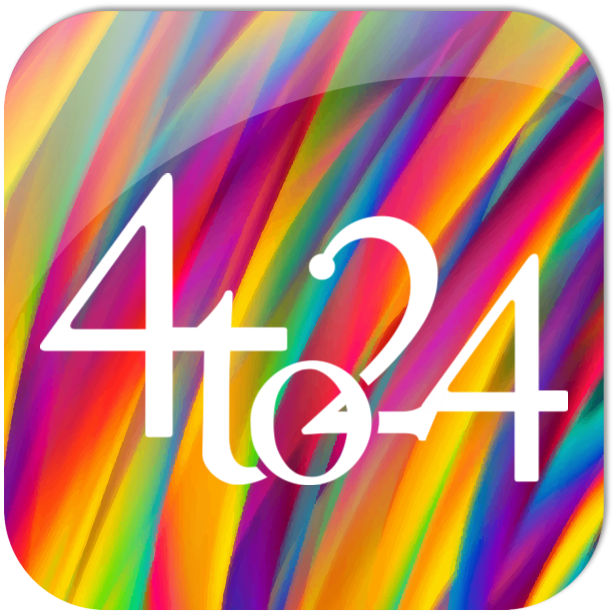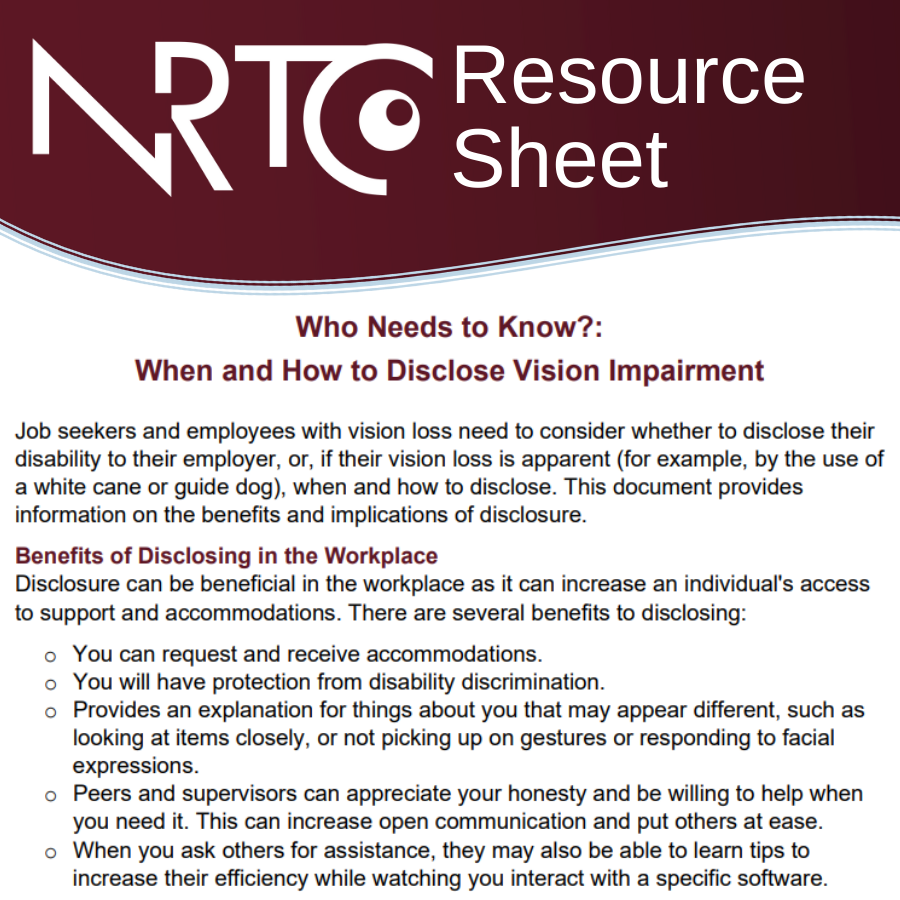The 4to24 App: Content for Professionals
The National Research and Training Center on Blindness and Low Vision (NRTC) is excited to share that the 4to24 app content is now available for professionals through an online portal.

The 4to24 app is a free resource for youth who are blind or have low vision and their parents. It covers ages 4 to 24 years, from preschool age into young adulthood and early career.
The portal is available through the NRTC’s web-based learning management system. Given the value of the app material for teachers and professionals, the online portal provides access to the 4to24 app’s information and topic areas. All app content is available, which includes information, activities, and links to resources about the skills and experiences that will be helpful to B/LV youth as they grow.
To register for the 4to24 online portal, you must be a professional working with people who are B/LV. To apply for access, please visit our 4to24 course page.
For more information about the app, visit our Transition Resources page.
Current Research Highlight: Exploration of National Datasets
Despite the availability of data about people with blindness and low vision (B/LV) in large national datasets, few researchers have used these resources to explore employment-related topics. This project aims to investigate employment outcomes beyond basic employment rates and examine the predictors of employment for people who are B/LV using five large national datasets.
The five national datasets are: (1) American Community Survey (ACS), (2) Survey of Income and Program Participation (SIPP), (3) Health and Retirement Study (HRS), (4) National Longitudinal Transition Study 2012, (5) National Longitudinal Survey of Youth 1997. We will explore job quality, underemployment, earnings, self-employment, and continuity of employment with this data. This information can inform practices, policies, and programs to maximize employment outcomes and economic self-sufficiency for the B/LV population.
Our investigation is guided by a large number of research questions and structured to allow us to explore one data set during each year of the study. Analyses began with the SIPP data, followed by the ACS data, to explore basic employment characteristics of people who are B/LV. To share these findings, we will be publishing a series of articles in the Journal of Visual Impairment and Blindness (JVIB) in 2022. Topics will cover full-time versus part-time employment, continuity of employment, disability benefit receipt and work, earnings, and self-employment.
The first article of this series was published in February:
- McDonnall, M.,Cmar, J., & McKnight, Z. S. (2022). Beyond employment rates: Full-time vs. part-time employment for people with visual impairments. Journal of Visual Impairment and Blindness 116(1), 7-13.
Additional analyses with SIPP and ACS data are ongoing during the second year of the project, and analyses of the HRS data will begin in the third year of the study. For more information about this research project, visit our research project webpage.
Training and Technical Assistance
New Resource

Job seekers and employees with vision loss need to consider if and when to disclose their disability to their employer. The Advice for Disclosing Your Vision Impairment resource sheet provides information and recommendations about disclosing vision impairment to employers.
This advice sheet is based on an NRTC webinar focused on disclosure, “Who Needs to Know?: When and How to Disclose Vision Impairment,” that shared insight from a group of panelists on the implication and benefits of disclosure. Visit our Webinars and Podcasts page to view the archived webinar.
New Online Course
We have one new course available:
Working with Blindness and Low Vision: This course provides an overview of blindness and low vision to educate eye healthcare providers on the vital role they play in how patients perceive and adjust to their vision loss. (1 hour IJCAHPO credit only).
All courses are available through our learning management system. For more information about our courses, visit our Frequently Asked Questions page.
Customizable Training Options
Are you interested in learning about the training and workshops available through the NRTC? The NRTC provides remote and in-person training and workshops centered around our mission of improving employment and independent living outcomes for individuals who are blind or have low vision. Visit our Customizable Training Option page to learn more about our customizable training options and review other available training topics.
Other NRTC News
NRTC Announces Farrow as OIB-TAC Project Director
The NRTC is pleased to announce the appointment of Kendra Farrow as Project Director of the Older Individuals who are Blind Technical Assistance Center (OIB-TAC). Farrow has been an integral member of the OIB-TAC staff since its beginning in October 2015. In addition to her work on the OIB-TAC and NIDILRR grants, Farrow has experience providing direct services, leading program evaluations, and presenting at local and national workshops and conferences. Read our news item for more information.
NRTC Recruiting for Virtual Job Interview Training Study
The NRTC is now recruiting participants for a remote usability study of a virtual job interview training program. We want to find out how young people with blindness and low vision use the program and get ideas for making it easier to use.
We are seeking transition-age youth (age 16 to 26 years) who use screen magnification software to access the Internet. Participants will attend one 2-hour Zoom session (to be scheduled in April 2022). To find out if you qualify, click here to apply now.
If you have any questions, please contact Anne Steverson at asteverson@colled.msstate.edu or 662-325-2001.
Welcome Tori Palm
The NRTC is excited to welcome Tori Palm to the team as an Administrative Assistant. Palm will be primarily working under the OIB-TAC grant to support the overall efforts of enhancing older blind programs for individuals who are blind or have low vision. She will also be assisting with our online courses.

Connect with the NRTC
Stay connected with the NRTC! Please consider connecting with us on our social media platforms and sharing this information with others who may appreciate daily updates, tips, and resources related to blindness and low vision. Follow the NRTC:
Publications, Presentations, and Miscellanies
Publications
McDonnall, M.,Cmar, J., & McKnight, Z. S. (2022). Beyond employment rates: Full-time vs. Part-time employment for people with visual impairments. Journal of Visual Impairment and Blindness 116(1), 7-13.
Crudden, A. & McKnight, Z. (In press.). Out of labor force due to health reasons? An analysis of the Survey of Income and Program Participation regarding persons with visual impairments. International Journal of Rehabilitation Research.
Crudden, A., & Steverson, A. (In press). Job retention: Perspectives of individuals with blindness and low vision. Journal of Vocational Rehabilitation.
Crudden, A., & McKnight, Z. S. (In press). Experiencing vision loss while employed: Factors associated with job retention. Journal of Rehabilitation.
Crudden, A., & McKnight, Z. S. (In press). Skills associated with job retention among persons who are blind or visually impaired. Journal of Visual Impairment and Blindness.
Stinson-Perez, S., & Lang, A. H. (In press). Independent living older blind programs in the United States: State trends based on best practices in the administration of the older blind program. Journal of Visual Impairment and Blindness.
Presentations
McDonnall, M., & Silverman, A. (2022, May 3). Access technology use in the workplace: Initial findings from longitudinal study. [Conference Session]. American Foundation for the Blind Leadership Conference, Arlington, VA. https://www.afb.org/about-afb/events-and-awards/afblc2022/2022-agenda
Webinars
April 13 (2:00 CST) - Who is a Qualified Professional?: During this webinar, participants will meet several Certified Vision Rehabilitation Therapists (CVRTs) and one Nationally Certified Rehabilitation Teacher for the Blind (NCRTB). Join us to learn about the field of vision rehabilitation and the education and training required for qualified professionals.
Workshops
April 26-27 – Putting Your Best Foot Forward (PYBFF): During this workshop, participants will be introduced to PYBFF, a job search skills training program for transition-age youth who are B/LV. After the workshop, participants will obtain access to the PYBFF curriculum. For more information and to register for upcoming PYBFF workshops, visit the PYBFF course page.